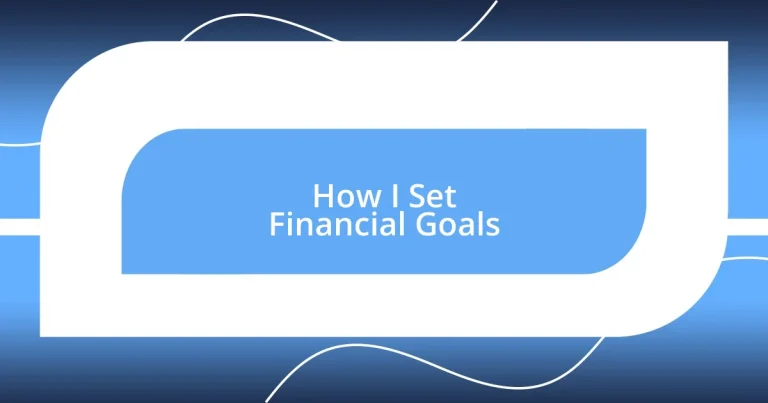Key takeaways:
- Understanding financial goals involves reflecting on personal values and defining actionable steps to achieve meaningful aspirations.
- Utilizing the SMART framework—Specific, Measurable, Achievable, Relevant, Time-bound—can clarify and structure financial objectives for better success.
- Regularly tracking progress and celebrating milestones boosts motivation, reinforces commitment, and enhances appreciation for the financial journey.

Understanding Financial Goals
Understanding financial goals is crucial for taking control of your financial future. When I first started setting my own goals, I realized they weren’t just about accumulating wealth but about defining what I truly valued in life. Reflecting on my priorities made me ask myself: What do I want my money to do for me?
Setting financial goals is like charting a course on a map. The goals you establish serve as waypoints that guide your decisions and actions along the way. I once set a goal to save for a family vacation, and every time I added to that fund, I felt a rush of excitement as I envisioned those moments of joy with my loved ones. Isn’t it amazing how tangible your dreams can become when they’re paired with actionable financial steps?
Distinguishing between short-term and long-term financial goals can also simplify your planning process. I used to get overwhelmed thinking about my financial future as a whole. But then, breaking it down—like wanting to pay off student loans this year and saving for retirement over the next few decades—turned my anxiety into motivation. How have you approached balancing the immediate with the distant?

Identifying Your Financial Values
Identifying your financial values lays the foundation for meaningful goal-setting. For me, understanding what truly matters—like family, security, and experiences—shaped how I allocate my resources. When I took the time to define my core values, it became clear that every purchase and saving strategy needed to align with those beliefs.
To clarify your financial values, consider these key aspects:
- What brings you joy? Reflecting on past experiences can highlight what you cherish most. I recall how my happiest moments were traveling with my friends, which shifted my focus on saving for experiences rather than material items.
- What do you find worthwhile? Think about the causes and services you support. I realized that investing in sustainable products wasn’t just a trend for me; it reflected my commitment to the environment.
- What level of security do you need? Understanding your comfort with risk is crucial. When I first learned about investments, I felt nervous but gradually recognized the importance of balancing risk with the potential for growth to achieve my long-term comfort level.
By diving into these aspects, you can begin to paint a clearer picture of your financial values, making it easier to set goals that resonate deeply with your personal beliefs.

Setting SMART Financial Objectives
Setting SMART financial objectives is a game-changer when it comes to reaching your financial goals. I’ve always believed that the clearer you define your goals, the more achievable they become. The SMART framework—Specific, Measurable, Achievable, Relevant, and Time-bound—helps in structuring these objectives effectively. I remember when I set a specific target to save a certain amount for a down payment on my first home within three years. By laying out the specifics, it transformed what felt like a daunting task into a clearer roadmap.
To illustrate this concept further, breaking down each component of SMART one at a time helps me understand my journey better. For instance, I aimed for a specific figure—let’s say $20,000—making it measurable. I calculated how much I needed to save each month and, in doing so, I felt more in control and less overwhelmed. It was enlightening to create a timeline; every month I ticked off savings, I felt a sense of accomplishment that propelled me to keep going.
Using this approach not only keeps your financial objectives realistic but also aligns them closely with your aspirations. I once set a goal to invest in my education, and by strategically outlining what I wanted to learn, how much it would cost, and setting a deadline, I found that relevant connection. It allowed me to pursue something meaningful while managing my finances wisely.
| SMART Criteria | Description |
|---|---|
| Specific | Clearly define what you want to achieve. |
| Measurable | Ensure your goal can be tracked with numbers or indicators. |
| Achievable | Your goal should be realistic and attainable. |
| Relevant | Align your goal with your broader life objectives and values. |
| Time-bound | Set a deadline to create a sense of urgency. |

Creating a Financial Action Plan
Creating a financial action plan is where the rubber meets the road in your journey toward your financial goals. I remember when I first put my plan together; I felt a mix of excitement and anxiety. It’s essential to break your objectives into actionable steps. For instance, if one of your goals is to save for a vacation, you might decide to set aside a specific amount each month. This makes it feel less overwhelming and more achievable.
Another crucial aspect is to keep track of your progress. When I started using a simple spreadsheet, I found it incredibly motivating to see my savings grow over time. It’s like a visual reminder that I’m moving closer to my goals. Have you ever noticed how seeing tangible progress can change your outlook? I was amazed at how even small contributions began to add up, reinforcing my commitment to the plan.
Lastly, don’t forget to review and adjust your action plan regularly. Life happens, and circumstances change. I once had to re-evaluate my budget when an unexpected car repair came up; it was a pain, but it taught me the importance of flexibility. Just like we adjust our goals, our action plans should evolve to ensure they remain relevant and effective. Have you experienced this too? Being proactive about adjustments can make all the difference in staying on track.

Tracking Your Progress Regularly
Keeping an eye on your financial progress is crucial in staying motivated and accountable. I learned this lesson firsthand when I decided to check in on my budget at the end of each month. Initially, I felt a mix of apprehension and curiosity as I tracked my expenses, but seeing tangible results transformed my relationship with money. Each time I noted a little victory, like sticking to my groceries budget, it sparked a sense of pride that made me want to push further.
Incorporating visual aids into my tracking routine really made a difference as well. I started using a colorful chart where I plotted my savings goals and expenditures. Suddenly, watching those bars rise felt rewarding, almost like playing a game. Have you ever felt that rush when you hit a milestone? There’s a kind of thrill in seeing your progress laid out in front of you—it reassures you that you’re indeed moving forward, even during months when it feels slow.
It’s essential to not just track for the sake of it but to reflect on what those numbers mean. When I hit my mini-goals, I took a moment to celebrate, whether that meant treating myself to a nice dinner or dedicating that time to journal about my feelings. Celebrating not only keeps me focused but also makes the journey richer. Remember, it’s not just about the end goal; it’s about appreciating the little strides you make along the way. How do you celebrate your wins?

Celebrating Achievements and Milestones
Recognizing and celebrating your achievements, no matter how small, can significantly boost your motivation. I vividly recall reaching my first savings milestone, where I finally set aside enough to cover an unexpected expense. I decided to celebrate by treating myself to a day out with friends. It was a simple gesture, but relishing that moment made me feel like a champion. Have you ever felt that rush of joy when rewarding yourself for your hard work?
Milestones serve as markers of progress, and I genuinely believe they deserve a moment of recognition. When I completed my first 10% of my overall savings goal, I threw a little party at home. I invited a few close friends and shared my journey with them. It transformed a solitary success into a shared celebration, reinforcing my commitment and joy in the process. How do you share your successes with others?
Furthermore, reflecting on these accomplishments can lead to greater clarity about your financial journey. After reaching each goal, I took time to journal my thoughts and emotions, capturing what that achievement meant to me. This practice not only deepened my appreciation for my hard work but also highlighted the changes I could make to enhance my future goals. Have you considered keeping a record of your feelings around your milestones? It truly transforms the numbers into moments worth cherishing.














